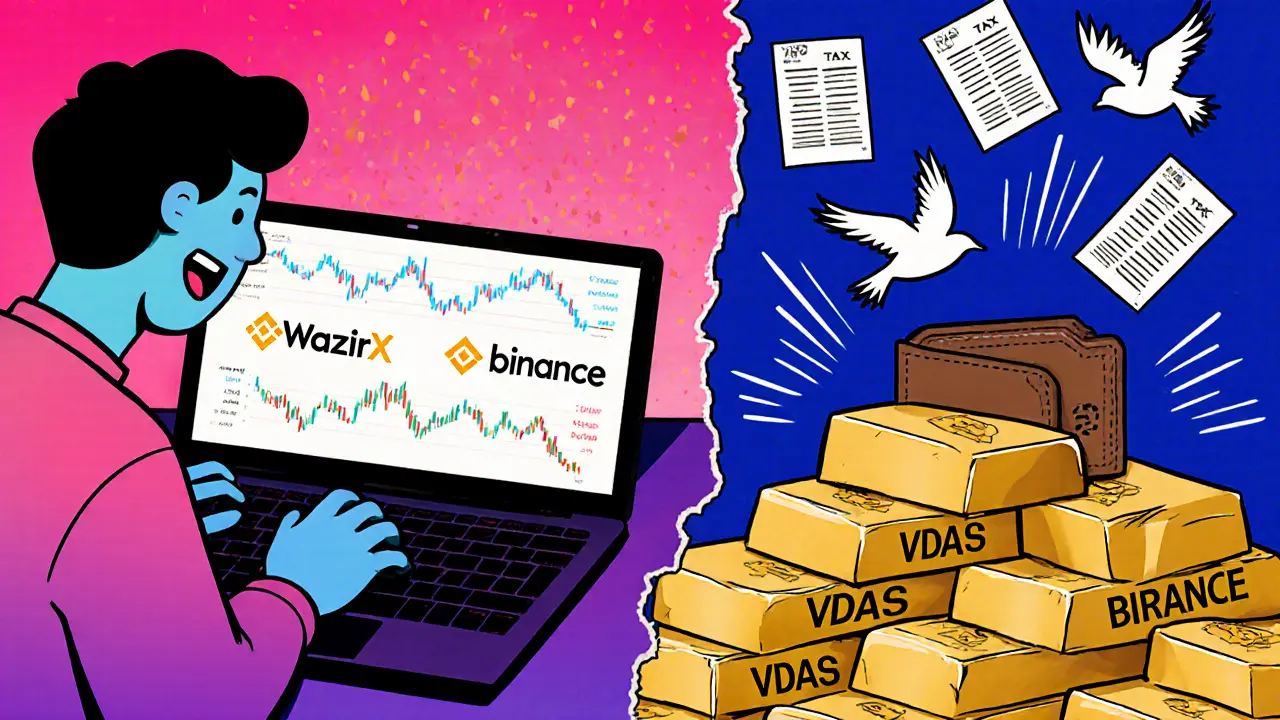Crypto Tax Calculator
Calculate Your Crypto Taxes in India
India taxes crypto profits at 30% plus 4% cess and deducts 1% TDS on transactions over ₹50,000.
Important Note: India imposes a flat 30% tax on all crypto profits with no deductions for losses. 1% TDS applies on transactions over ₹50,000.
Can you use Bitcoin or Ethereum to pay for your coffee in Mumbai? Or buy a phone on Amazon India with Dogecoin? The short answer is no. As of 2025, using cryptocurrencies to pay for goods or services in India is explicitly illegal-even though buying, selling, and holding crypto is still perfectly legal.
Trading Crypto Is Fine. Paying With It Is Not.
India has a split policy: you can trade crypto like stocks, but you can’t use it like cash. This isn’t a loophole-it’s by design. The government treats cryptocurrencies as Virtual Digital Assets (VDAs), not currency. That means they’re taxed like property, not money.
Think of it this way: you can own gold bars, but you can’t walk into a grocery store and hand over a bar of gold to pay for rice. Same logic applies here. Crypto is treated as an investment asset, not a payment tool. If you try to pay a vendor with Bitcoin, you’re breaking the law-even if they’re willing to accept it.
Why Did India Ban Crypto Payments?
The Reserve Bank of India (RBI) has been clear for years: private cryptocurrencies threaten financial stability. They don’t have backing, aren’t regulated, and can’t be reversed if something goes wrong. Unlike the Indian Rupee, which the RBI controls, crypto moves outside the system. That’s a problem for a country trying to track money flows, stop black money, and protect consumers.
There’s also the fear of anonymity. While most exchanges require KYC, some users still try to move crypto through peer-to-peer platforms or offshore wallets to avoid taxes or launder money. The government doesn’t want that kind of system replacing the rupee.
Instead, India is pushing its own digital currency-the Digital Rupee (e-Rupee). It’s not Bitcoin. It’s not Ethereum. It’s a government-backed digital version of the Indian Rupee, issued by the RBI. It works like mobile payments but with full traceability. The goal? To give people the speed and convenience of crypto without the risks.
What Can You Legally Do With Crypto in India?
Even though you can’t pay with crypto, you can still do a lot:
- Buy and sell Bitcoin, Ethereum, Solana, and other coins on registered exchanges
- Hold crypto in your wallet as an investment
- Trade on Indian platforms like WazirX, CoinSwitch Kuber, or ZebPay
- Use international exchanges like Binance or Bybit-if they’re registered with FIU-IND
All exchanges operating in India must be registered with the Financial Intelligence Unit of India (FIU-IND). They must collect your ID, track your transactions, and report anything suspicious. If you’re trading on an unregistered platform, you’re at risk-not just legally, but financially. Many unregistered platforms have shut down overnight, locking users out of their funds.

How Is Crypto Taxed in India?
India has one of the strictest crypto tax regimes in the world. Here’s what you’re paying in 2025:
- 30% tax on all profits from crypto sales (no deductions for losses)
- 1% TDS on every transaction over ₹50,000-this is automatically withheld by the exchange
- 18% GST on platform fees, withdrawal charges, and trading commissions
- Mandatory reporting in your income tax return under Schedule VDA (Form ITR-2 or ITR-3)
Let’s say you bought 1 BTC for ₹30 lakh and sold it for ₹40 lakh. You made ₹10 lakh profit. You owe ₹3 lakh in tax-no matter if you lost money on other trades that year. And if you bought another coin for ₹60,000, the exchange will automatically deduct ₹600 as TDS before you even get the money.
Many traders find this unfair. You can’t offset losses. If you lose ₹5 lakh on one coin and make ₹5 lakh on another, you still pay 30% tax on the gain. There’s no capital loss carryforward like with stocks.
What Happens If You Get Caught Using Crypto to Pay?
There’s no specific criminal penalty written into law yet for paying with crypto-but that doesn’t mean you’re safe.
If you use crypto to pay for something, the transaction can be flagged as tax evasion or money laundering. The FIU-IND monitors all registered exchanges and can trace wallet addresses linked to KYC’d users. If you’re paying a business in crypto and they don’t report it, both you and the business could face scrutiny.
Enforcement is already happening. In 2024, Binance was fined ₹18.8 crore for failing to report transactions. Bybit paid ₹9.2 crore. Both were allowed to continue operating after they fixed their compliance systems. That’s the pattern: fines first, then compliance. The government isn’t trying to shut down crypto-it’s trying to control it.

What About Peer-to-Peer (P2P) Payments?
Some people try to bypass the ban by using P2P platforms like LocalBitcoins or Paxful. They find someone willing to accept crypto in exchange for cash or UPI. But here’s the catch: if the transaction crosses ₹50,000, TDS kicks in. And if the exchange you’re using is registered, they report it. If you’re using an unregistered P2P app, you’re not just risking tax trouble-you’re risking fraud. There’s no buyer protection. No chargebacks. No recourse if the other person disappears.
There’s also a growing number of scams targeting crypto users in India. Fake “crypto payment gateways” promise to let you pay for services with Bitcoin. They’re not real. They’re just phishing sites designed to steal your wallet keys.
Is There Any Hope for Change?
Not anytime soon. The government has shown no interest in legalizing crypto as payment. The Finance Ministry has drafted a bill to ban private cryptocurrencies entirely-but it hasn’t been tabled in Parliament yet. Why? Because the political cost is high. Millions of Indians hold crypto. A total ban would trigger backlash.
So the current system is a compromise: keep crypto alive as an asset class, but shut the door on payments. The real future of digital money in India is the Digital Rupee. It’s already being tested in pilot programs across banks and retail. By 2026, you might be able to pay your electricity bill or buy groceries with a digital rupee app-no volatility, no taxes on transfers, no risk.
For now, crypto in India is a high-risk investment, not a payment method. Treat it like stocks or gold-not like cash. If you’re thinking of using it to pay for anything, don’t. The legal and financial risks aren’t worth it.
What’s Next for Crypto in India?
The next two years will be critical. If the Digital Rupee gains widespread adoption, private crypto could fade into the background as a niche investment. If it fails, pressure might build to relax rules on crypto payments.
But don’t expect a sudden change. India moves slowly on financial regulation. What’s clear now is this: crypto is here to stay-but only as an asset. Not as money.
Can I use Bitcoin to pay for anything in India?
No. Using Bitcoin, Ethereum, or any other cryptocurrency to pay for goods or services is explicitly prohibited in India as of 2025. While you can legally buy and hold crypto, it cannot be used as a payment method in stores, online shops, or peer-to-peer transactions.
Is crypto trading legal in India?
Yes. Trading, buying, and holding cryptocurrencies is legal in India, but only through exchanges registered with the Financial Intelligence Unit of India (FIU-IND). Platforms like WazirX, CoinSwitch Kuber, and registered international exchanges like Binance are allowed to operate under strict KYC and AML rules.
How much tax do I pay on crypto profits in India?
You pay a flat 30% tax on all crypto profits, plus a 4% cess. Additionally, 1% TDS is deducted on every transaction over ₹50,000. There are no deductions for losses, and you must report all crypto income in Schedule VDA of your income tax return (ITR-2 or ITR-3).
Can I use Binance or Bybit in India?
Yes, but only if they are registered with FIU-IND. Both Binance and Bybit were fined in 2024 for non-compliance but have since registered and now operate legally in India under the same KYC and reporting rules as domestic exchanges.
What is the Digital Rupee, and how is it different from crypto?
The Digital Rupee (e-Rupee) is India’s official central bank digital currency, issued by the Reserve Bank of India. Unlike Bitcoin or Ethereum, it’s backed by the government, has no price volatility, and is legal tender. It’s designed to replace cash and digital wallets, not compete with private cryptocurrencies.
Are crypto payments through P2P platforms legal?
No. Even if you find someone willing to accept crypto in exchange for cash or UPI, the transaction still violates India’s ban on crypto payments. If the platform is registered, the transaction will be flagged. If it’s unregistered, you risk fraud and have no legal recourse.
What happens if I don’t report my crypto income?
You risk tax notices, penalties, interest charges, and even invalidation of your tax return. The Income Tax Department cross-checks data from exchanges and FIU-IND reports. Non-disclosure is treated as tax evasion and can lead to prosecution under the Income Tax Act.
Will India ever allow crypto payments in the future?
It’s unlikely in the near term. The government’s focus is on promoting the Digital Rupee as the future of digital payments. Crypto is seen as a speculative asset, not a payment tool. Any change would require new legislation, and there’s no political momentum for it right now.
